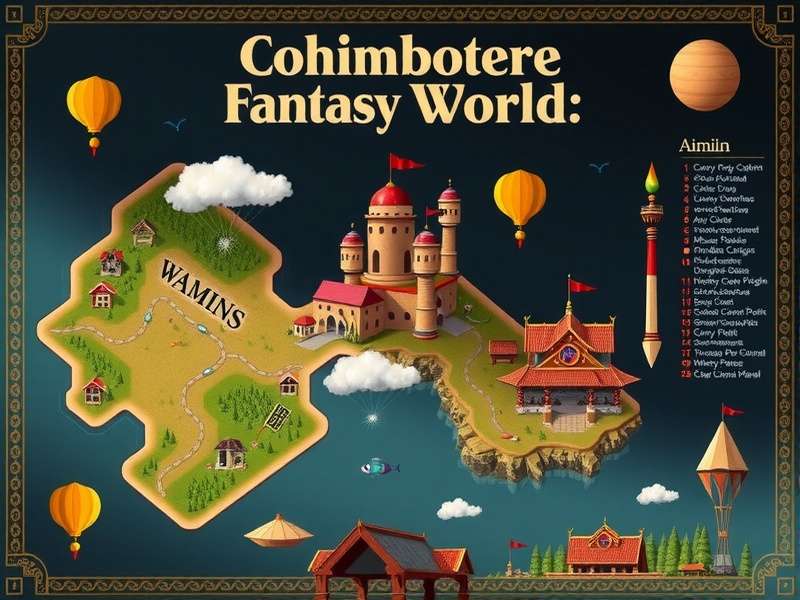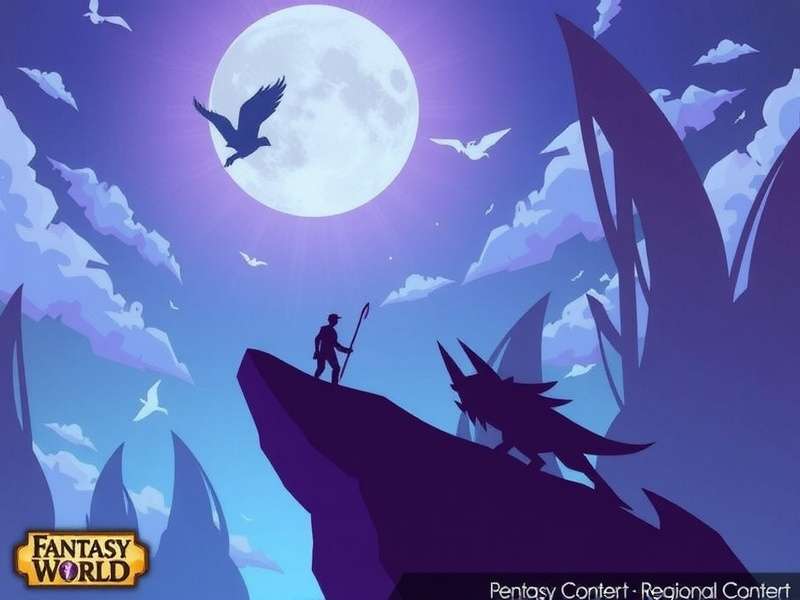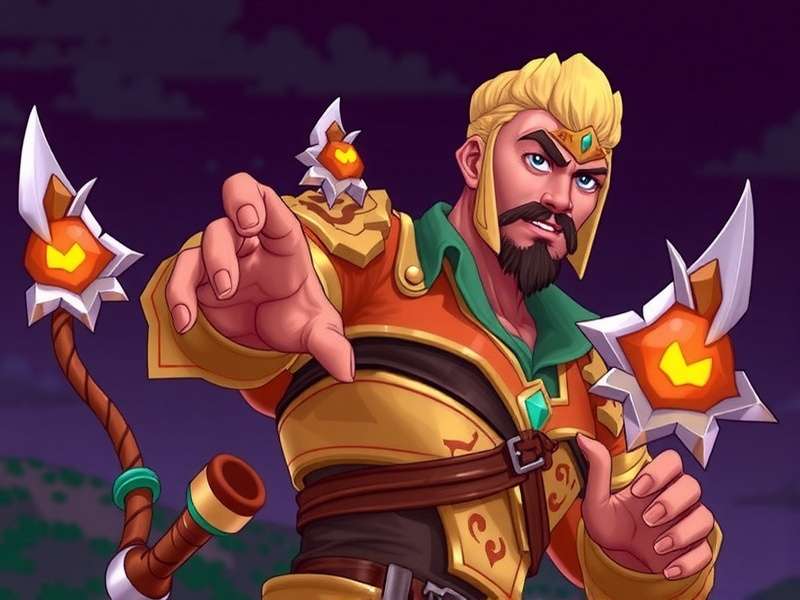Coimbatore Fantasy World

🌟 Welcome to the ultimate guide for Coimbatore Fantasy World – India's most beloved fantasy role-playing game (RPG) that has captured the imagination of millions across the nation! Launched in 2023 by a team of passionate Indian developers, this game blends rich mythology, local folklore, and cutting-edge mobile gaming technology to create an unforgettable experience.
Whether you're a hard-core RPG fan or a casual gamer looking for adventure, Coimbatore Fantasy World offers something for everyone. Set in a magical version of Coimbatore and its surrounding regions, the game lets you explore enchanted forests, ancient temples, and mythical realms inspired by South Indian legends. From battling Asuras (demons) to befriending celestial beings, every quest feels like a journey through India's vibrant mythological tapestry!
Overview of Coimbatore Fantasy World
Coimbatore Fantasy World was born from a simple idea: to create a fantasy game that feels uniquely Indian, not just a copy of Western or Japanese RPGs. The developers, a team of 30+ gamers and mythology enthusiasts from Tamil Nadu, spent over two years researching local tales, temple inscriptions, and regional folklore to build the game's universe.
The game is set in "Ancient Kongu Nadu" – a magical reimagining of the historical Kongu region that includes modern-day Coimbatore, Tirupur, and parts of Kerala. In this world, myth and reality collide: you'll find familiar landmarks like the Marudhamalai Temple, but here it's guarded by a celestial Nandi (bull) spirit. The Noyyal River isn't just a water body – it's the earthly manifestation of a river goddess who grants special powers to worthy adventurers.
What makes Coimbatore Fantasy World truly special is its commitment to cultural authenticity. Unlike many fantasy games that use generic elves and dragons, this game features creatures from Indian mythology: Yakshas (nature spirits), Gandharvas (celestial musicians), and even the occasional Rakshasa (demon) from the Ramayana. The game's magic system is based on Ayurveda and Siddha practices, with potions made from medicinal herbs like neem and tulsi, and spells inspired by ancient Tamil mantras.
Since its launch in July 2023, the game has grown exponentially, with regular updates adding new regions, quests, and characters. It's not just a game – it's a love letter to South Indian culture, designed to make players proud of their heritage while enjoying a world-class gaming experience.

Gameplay Mechanics of Coimbatore Fantasy World
Core Gameplay Loop
🎮 At its heart, Coimbatore Fantasy World is an open-world action RPG where players create a custom character and embark on an epic quest to save Ancient Kongu Nadu from the "Dark Plague" – a mysterious force corrupting the land's magic. The core gameplay revolves around:
• Questing: Completing main story quests, side missions, and daily challenges to earn rewards and progress the narrative.
• Combat: Real-time battles using a mix of melee attacks, ranged spells, and special abilities. The combat system is easy to learn but deep enough for strategic players – you can dodge, parry, and combo attacks for maximum damage.
• Exploration: Discovering hidden locations, secret treasures, and lore fragments scattered across the open world. Many areas are only accessible once you've unlocked specific abilities, encouraging revisiting old regions.
• Crafting: Creating potions, weapons, and armor using materials gathered from the environment. Special "Siddha Workshops" in major towns let you craft legendary items with rare ingredients.
• Character Progression: Leveling up your character, unlocking new skills, and choosing from five unique classes: Vedic Warrior, Siddha Mage, Kurinji Archer, Marutham Farmer (yes, a farming-based class with nature powers!), and Pallava Scout.
Unique Gameplay Features
Coimbatore Fantasy World stands out from other mobile RPGs with several innovative features tailored for Indian players:
• Kolam Magic: A unique puzzle-based magic system where drawing traditional Kolam patterns (South Indian floor designs) during combat unleashes powerful area-of-effect spells. The more complex the Kolam, the stronger the spell – but it takes longer to draw!
• Festival Events: In-game events tied to Indian festivals that change gameplay temporarily. During Pongal, for example, farming-based quests give extra rewards, and special "sugarcane weapons" become available. Diwali brings "diyas" (oil lamps) that reveal hidden paths in dark areas.
• Community Shrines: Players can contribute resources to build and upgrade community shrines in each town. When a shrine is fully upgraded, all players in that region get a permanent buff (like increased XP or better loot drops) for a week. It's a great way to encourage cooperation!
• Dynamic Weather: The game's weather system affects both gameplay and story. Monsoon rains make certain areas muddy and slow to traverse but boost the power of water-based spells. Summer heat can cause dehydration, requiring players to carry water pouches – but it's the best time to find rare desert flowers for crafting.

Character Classes & Customization
One of the most praised aspects of Coimbatore Fantasy World is its diverse range of character classes, each inspired by different aspects of Indian culture:
• Vedic Warrior: A melee fighter who uses ancient Vedic chants to empower their weapons. Specializes in tanking damage and protecting allies. Armor designs are based on traditional South Indian warrior attire, with intricate kolam patterns on shields.
• Siddha Mage: A spellcaster who draws power from Siddha medicine and alchemy. Can heal allies or unleash elemental attacks (fire, water, earth, air). Their robes feature symbols from ancient Tamil palm leaf manuscripts.
• Kurinji Archer: A ranged attacker from the hilly regions (inspired by the Kurinji ecological zone). Uses bows made from bamboo and arrows tipped with poison from local plants. Specializes in stealth and precision attacks.
• Marutham Farmer: A unique class that controls plant life and uses farming tools as weapons (like a sickle for slashing or a plow for area attacks). Can summon vines to trap enemies or grow healing plants. Popular among casual players for its laid-back playstyle.
• Pallava Scout: A fast, agile class inspired by the ancient Pallava dynasty's spies. Uses dual daggers and can vanish into shadows. Great for players who enjoy stealth missions and quick, hit-and-run tactics.
Each class has 30+ unique skills to unlock, and players can further customize their characters with hundreds of cosmetic items, including:
• Traditional attire like dhotis, sarees, and lungis with regional patterns
• Jewelry inspired by temple sculptures (like the famous dancing Shiva earrings)
• Weapon skins that transform your gear into traditional items (like a mace that looks like a temple chariot wheel)
• Pet companions, including mythical creatures like the Yali (a lion-elephant hybrid from South Indian mythology) and the Garuda (eagle-man)
Localization & Regional Versions
Language Support
🗣️ Understanding India's linguistic diversity, Coimbatore Fantasy World offers full localization in 15 Indian languages, making it accessible to players across the country. This is more than most mobile games in India, showing the developers' commitment to inclusivity. The supported languages are:
Hindi | Tamil | Telugu | Kannada | Malayalam | Bengali | Marathi | Gujarati | Punjabi | Odia | Assamese | Urdu | Konkani | Nepali | Bhojpuri
What's impressive is that the localization isn't just translation – it's cultural adaptation. For example, in the Tamil version, characters use colloquial terms like "machan" (friend) and "inga vaa" (come here), while the Punjabi version includes phrases like "ki haal hai" (how are you) and "chak de phatte" (go for it). Quest names are also adapted – a mission called "The Temple Guardian" becomes "கோயில் காவலர்" (Koil Kavalar) in Tamil and "ਮੰਦਰ ਦਾ ਰੱਖਵਾਲਾ" (Mandir Da Rakshwala) in Punjabi.
The game's voice acting is also localized, with regional voice actors hired to record dialogues. This adds a level of authenticity that players love – many have commented that hearing their mother tongue in a high-quality game makes the experience much more immersive.
Regional Content Differences
While the main story remains the same across India, Coimbatore Fantasy World includes regional content to make the game feel relevant to players from different states. This is a unique approach that has helped the game gain popularity beyond its South Indian roots.
• North India: Players in North India get exclusive quests involving the Himalayan mountains (reimagined as a realm of ice gods) and characters inspired by Punjabi folklore, like the "Naga Sadhu" (a wandering ascetic with snake-like powers). During Lohri, special fire-based events are added, and the in-game marketplaces sell North Indian snacks like jalebi and lassi.
• East India: The game's East Indian version includes missions set in a magical Sunderbans, where players encounter "Bonbibi" (the forest goddess of Bengal) and battle demonic tigers. Durga Puja brings special events where players can collect "prasadam" (blessed food) to gain temporary buffs, and the architecture in eastern towns resembles Bengali terracotta temples.
• West India: Players here can explore a fantasy version of the Western Ghats and the Rann of Kutch. Quests involve Gujarati folk tales, like the story of "Narsinh Mehta," and characters include "Gopis" (cowherd girls) with nature magic. During Navratri, the game adds Garba dance-inspired combat moves that deal extra damage to demons.
• South India: The game's original region features the most content, with quests based on Tamil, Telugu, Kannada, and Malayalam myths. Players can visit a magical version of Munnar's tea plantations, battle demons in the Coimbatore cotton fields, and seek blessings from gods like Murugan and Ayyappa. Pongal and Onam events are particularly elaborate here, with special farming quests and boat races.
• Northeast India: Added in the 2024 update, this region includes missions set in a fantasy Assam, with characters inspired by Bodo and Mizo folklore. Players can ride elephants into battle and use bamboo-based weapons. The Hornbill Festival brings special events with bird-themed powers and rewards.

Download Stats & Player Reviews
Download Numbers in India
📈 Coimbatore Fantasy World has achieved remarkable success in India's competitive mobile gaming market. As of October 2025, just over two years after its launch, the game has crossed 12.4 million downloads in India, with no signs of slowing down. Here's a detailed breakdown:
• Google Play Store: 10.1 million downloads, with a 4.7/5 rating from 450,000+ reviews
• Apple App Store: 2.3 million downloads, with a 4.8/5 rating from 120,000+ reviews
• Most Popular States: Tamil Nadu (32%), Karnataka (18%), Kerala (14%), Maharashtra (10%), Andhra Pradesh (9%)
• Active Users: 3.2 million daily active users (DAU), 7.8 million monthly active users (MAU)
• Demographics: 65% male, 35% female; 18-35 age group makes up 78% of players
• Session Length: Average 42 minutes per session (higher than the Indian mobile game average of 28 minutes)
The game's growth has been fueled by its festival events – the Diwali 2024 update alone drove 850,000 new downloads in a single week, thanks to its exclusive "Lakshmi's Blessing" questline and free cosmetic items. The Pongal 2025 event saw a 30% increase in daily active users, with many players logging in just to participate in the in-game bull race mini-game.
Interestingly, the game has found particular success in Tier 2 and Tier 3 cities, where its low data usage (15-20MB per hour) and compatibility with mid-range Android devices (like Xiaomi Redmi and Realme models) have made it accessible to players with limited resources. The developers have actively optimized the game for these devices, with a "Lite Mode" that reduces graphics quality but maintains smooth gameplay.
Player Reviews & Feedback
Indian players have embraced Coimbatore Fantasy World with overwhelming positivity. Here's a selection of authentic reviews from players across the country, showing the game's broad appeal:
"Being a Coimbatore local, seeing Marudhamalai Temple in the game gave me goosebumps! The way they've added the Nandi statue as a quest giver is brilliant. I feel so proud that our culture is being represented in such a high-quality game. The Kolam magic system is so unique – my grandma taught me to draw kolams, and now I'm using that skill to defeat demons! 5 stars, no doubt." – Karthik, 27, Coimbatore
"I'm from Punjab but love South Indian culture, and this game is the perfect mix! I play the Vedic Warrior class, and I love how they've included both Tamil and Punjabi warrior traditions in the skills. The Lohri event was amazing – fighting demons with a fire sword while collecting popcorn (yes, popcorn!) as rewards. My little brother now asks me to tell him stories about the game's gods and demons. Great way to teach kids about mythology!" – Simran, 29, Ludhiana
"Finally, a mobile RPG that doesn't make me feel like I need to spend money to win! I've been playing for 8 months without spending a rupee, and I've completed 90% of the content. The daily quests give enough rewards to keep progressing, and the community shrines mean even casual players like me can contribute. The Bengali localization is spot on – feels like the characters are talking just like my family does. Please add more Kolkata landmarks in the next update!" – Arnab, 34, Kolkata
"As a farmer's daughter from Maharashtra, I was so excited to see the Marutham Farmer class! It's not often you get to play a farmer as a hero in games. The way they've incorporated farming into combat – using sickles to slash enemies and growing healing plants – is genius. The Ganesh Chaturthi event was my favorite so far, with the giant Ganesh statue that gives blessings. The only downside is that the game sometimes lags on my old phone, but Lite Mode fixes that." – Sunita, 22, Pune
Common praise points in reviews include the game's cultural authenticity, generous reward system (compared to other mobile RPGs), diverse character classes, and engaging story. The most requested improvements are more regional landmarks, longer festival events, and a multiplayer mode for teaming up with friends (currently in development).
Indian Player Guides & Strategies
Beginner Tips for New Players
🆕 Just starting your journey in Coimbatore Fantasy World? Here are essential tips from India's top players to help you get started on the right foot:
• Choose the Right Class for Your Playstyle: Don't just pick a class because it looks cool! If you prefer fighting up close, go with Vedic Warrior. If you like staying back and using magic, Siddha Mage is better. For casual players, Marutham Farmer is easiest to learn – his plant summons do much of the work for you!
• Complete Daily Quests First: Daily quests give "Siddha Stones" – the most important currency for upgrading gear. Even if you only have 10 minutes to play, do the dailies. Over time, the rewards add up to help you progress faster.
• Learn Basic Kolam Patterns: Even if you're not a Siddha Mage, knowing simple Kolam patterns (like the "Padi Kolam" with 5 dots) can save your life. Drawing them during combat creates a healing circle or damages nearby enemies. Practice in the training area until you can draw them quickly.
• Explore Every Nook and Cranny: The game hides "lore scrolls" in hard-to-find places that give extra XP and tell interesting stories about the world. Some scrolls even unlock secret quests! Check behind waterfalls, under bridges, and on top of temple roofs.
• Join a Community Shrine Early: Find a shrine in your starting town and contribute whatever resources you can (even small amounts help). When the shrine levels up, you'll get a buff that makes questing easier. It's also a great way to meet other players in the chat.
• Save Resources for Festival Events: Many players waste "Prasadam" (special event currency) on regular items, but they're best saved for festival events. Events usually offer exclusive gear that's much better than anything available in the regular game.
• Don't Ignore Side Quests: Side quests might seem like extra work, but they often give unique rewards – like a special mount or a powerful early-game weapon. Some side quests also unlock fast-travel points, which save a lot of time later.

Advanced Strategies for Expert Players
🔥 For players who've mastered the basics and are looking to dominate Coimbatore Fantasy World, here are pro strategies from India's top 100 ranked players:
• Optimize Your Skill Rotation: Each class has an optimal order to use skills for maximum damage. For example, Vedic Warriors should use "Agni Strike" → "Shield Bash" → "Vedic Chant" → "Earthquake Slam" for their combo. Practice this until it becomes muscle memory.
• Weather-Based Loadouts: Create different gear sets for different weather conditions. For monsoon season, equip water-resistant armor and lightning-based weapons (they deal 20% more damage in rain). For summer, use heat-resistant gear and fire spells.
• Farm Rare Materials During Specific Times: Many rare crafting materials only appear at certain times. The "Moonflower" (used for powerful potions) only blooms between 8 PM and 4 AM in-game time, while "Sunstone" is most common between 10 AM and 2 PM. Set a timer to collect these!
• Master Advanced Kolam Combos: Expert players combine multiple Kolam patterns for devastating effects. For example, drawing a "Rangoli" pattern followed by a "Swastika" creates a vortex that pulls enemies in and then explodes. This takes practice but is worth it for boss fights.
• Exploit Enemy Weaknesses Based on Mythology: Enemies in the game are based on Indian myths, and they have myth-based weaknesses. For example, Rakshasas (demons) are weak to "holy water" from temple ponds, while Yakshas (nature spirits) take extra damage from fire. Learn these weaknesses to save time and resources.
• Coordinate with Shrine Communities: Top players communicate with their shrine communities to plan resource donations. By timing donations to hit the next shrine level just before a big event, everyone gets the buff during the event – giving your whole region an advantage.
• Use the Environment to Your Advantage: The game's physics system allows creative combat. Lure enemies under hanging boulders and shoot the ropes to crush them. Or, during monsoons, lead enemies to flooded areas where they move slower while you attack from a distance.
• Plan Character Builds Around Festival Events: Each festival event favors certain playstyles. For example, the Holi event increases damage from color-based attacks, so smart players respec their skills to focus on those abilities a week before the event starts.
Local Events & Community
Indian Festival Events
🎉 One of Coimbatore Fantasy World's biggest draws is its elaborate festival events, which celebrate India's diverse cultural heritage. These limited-time events (usually 7-10 days long) add new quests, items, and gameplay mechanics, keeping the game fresh for long-term players.
• Diwali Dhamaka: The game's most popular event transforms the world with festive lights and fireworks. Players collect "diyas" (oil lamps) to light up dark areas and battle "Rakshasa" demons that hate light. The final boss is a giant "Narakaasura" demon that drops the exclusive "Lakshmi's Blessing" armor set. Players can also exchange candies for cosmetic items like firecracker staffs and rangoli capes.
• Pongal Harvest: A celebration of agriculture, this event adds farming mini-games where players grow crops to feed village NPCs. The better your crop yield, the better the rewards! Special quests involve protecting fields from "Pest Demons" and racing bulls (yes, you ride the bulls!) to win "sugarcane juice" – which acts as a powerful healing potion. Top farmers get a "Farmer King/Queen" title and a golden plow weapon skin.
• Holi High: The game world is covered in colored powder, and players can throw "gulal" at enemies to deal damage and temporarily blind them. New quests involve collecting rare flowers to make the brightest colors, and there's a team-based mode where players paint landmarks in their team's color. Rewards include a "Rainbow Bow" and "Gulal Grenade" ability.
• Onam Festival: Set in a magical version of Kerala's backwaters, this event features boat races (players control snake boats in races against NPCs) and "pookalam" (floral arrangement) puzzles that unlock treasure chests. The final event is a feast where players collect 108 different virtual dishes (each with a unique buff) to offer to King Mahabali. Completing the feast gives a "Mahabali's Crown" cosmetic item.
• Durga Puja: Added in 2024, this event lets players help build virtual pandals (temporary temples) and battle the demon Mahishasura in a 10-stage boss fight. Each day of the puja unlocks a new form of Durga who grants special powers. The reward is a "Trishul" (trident) weapon that can transform into different forms based on the day of the week.

Community & Player Interaction
Coimbatore Fantasy World has built a thriving community of Indian players, with millions interacting daily through in-game chat, social media, and local meetups. Here's how players connect:
• In-Game Shrine Chats: Each community shrine has a dedicated chat channel where players coordinate donations, share tips, and organize group quests. These chats are often in regional languages, making it easy for players who aren't fluent in English to participate.
• Regional Facebook Groups: There are over 50 active regional groups, like "Coimbatore Fantasy World Tamil Players" (350,000+ members) and "CFW North India Warriors" (220,000+ members). These groups share fan art, organize online tournaments, and even arrange real-life meetups in cities like Chennai, Bangalore, and Delhi.
• YouTube and Gaming Channels: Indian gaming influencers have embraced the game, with channels like "Fantasy Gamer Raj" (Chennai) and "Punjab Fantasy King" (Amritsar) amassing over 1 million subscribers each. These creators post walkthroughs, class guides, and event previews, often in a mix of English and regional languages.
• Local Tournaments: The developers sponsor monthly "Fantasy Battles" tournaments in major cities, with cash prizes (up to ₹50,000) for winners. The 2024 Chennai tournament drew over 2,000 participants, with the final match streamed live on YouTube and watched by 150,000+ viewers.
• School and College Clubs: Unusually for a mobile game, Coimbatore Fantasy World has inspired gaming clubs in over 300 Indian colleges. These clubs organize intra-college tournaments and even use the game's mythology to host quiz competitions about Indian culture.
The developers actively engage with the community through monthly "Dev Diaries" videos (released in multiple languages) where they share upcoming features and answer player questions. They also run polls on social media to let players vote on new content – for example, the 2025 decision to add Northeast India content came from a poll that received 1.2 million votes.
Technical Details & Requirements
Device Compatibility
📱 Coimbatore Fantasy World is designed to work on a wide range of mobile devices, making it accessible to players across India – even those with mid-range or older smartphones. Here are the technical requirements:
• Android: Requires Android 7.0 (Nougat) or higher, 2GB RAM, and 2.5GB of free storage. Optimized for popular Indian brands like Xiaomi, Samsung, Realme, Motorola, and Lava. Works smoothly on devices priced ₹8,000 and above.
• iOS: Requires iOS 12.0 or later, compatible with iPhone 6s and newer models, as well as iPads. Optimized for iPhone 11 and later for best performance, but still playable on older iPhones with reduced graphics settings.
The game offers three graphics settings to accommodate different devices:
• Lite Mode: For older devices or areas with poor internet. Reduces texture quality and disables some effects (like shadows and weather particles) but runs at a steady 30fps. Uses 30% less data than other modes.
• Standard Mode: The default setting for most mid-range devices. Balances graphics and performance, with all core visual effects enabled. Runs at 30-45fps on most devices.
• HD Mode: For high-end devices. Maximum texture quality, detailed shadows, and enhanced weather effects. Runs at 60fps on flagship phones like the Samsung Galaxy S24 or iPhone 15.
One of the game's most praised features is its "Data Saver" option, which reduces background downloads and compresses textures. This is especially popular in rural areas with limited data plans, as it cuts data usage by up to 50%.
Internet Requirements & Offline Play
While Coimbatore Fantasy World requires an internet connection for most features (multiplayer elements, events, leaderboards), it offers a robust "Offline Mode" for players with unreliable connectivity – a crucial feature for many parts of India.
In Offline Mode, players can:
• Play previously completed story quests and side missions
• Practice combat in the training area
• Craft items using materials collected earlier
• Manage their inventory and skill points
Progress made in Offline Mode (like XP and crafting materials) is saved locally and synced to the server once an internet connection is restored. However, players can't access new quests, community shrines, or events offline.
For online play, the game is optimized for India's mobile networks, with support for 2G, 3G, 4G, and 5G connections. It uses approximately 15-20MB of data per hour of gameplay, which is lower than most open-world mobile games (which typically use 30-50MB/hour). The developers also offer a "Wi-Fi Only" download option for updates, preventing large files from eating into mobile data plans.

Future Updates & Roadmap
The developers of Coimbatore Fantasy World have shared an exciting roadmap for the next 12 months, based on player feedback and their own vision for the game's growth:
• Multiplayer Raids (December 2025): The most requested feature – 4-player cooperative raids against powerful bosses like "Ravana's Spirit" and "Kaliya the Snake Demon." Players will need to coordinate their classes and abilities to succeed, with unique rewards for completing raids on higher difficulties.
• New Region: Rajasthan Desert (March 2026): A vast desert area inspired by Rajasthan's Thar Desert, featuring new quests based on Rajput warrior legends and Rajasthani folk tales. Players will battle sand demons, explore ancient forts, and meet new characters like the "Desert Sage" and "Rajput Princess."
• Mount System Overhaul (June 2026): New mounts including elephants, camels, and mythical creatures like the "Yali" and "Garuda." Mounts will have unique abilities – for example, elephants can smash through walls, while Garudas can fly over obstacles.
• Player Housing (September 2026): Players will be able to buy and customize their own homes in each major town, decorated with regional furniture (like Tamil-style wooden swings or Bengali terracotta statues). Homes can be visited by friends, and some even have gardens where players can grow rare crafting materials.
• Mythology Expansion (December 2026): Adding stories and characters from the Mahabharata, with new quests involving Arjuna, Krishna, and the Pandavas. This will include a massive new dungeon based on the "Kurukshetra War."
The developers also plan to add 3 new languages (Sanskrit, Tulu, and Manipuri) and improve the game's accessibility features, including better text-to-speech options for visually impaired players and simplified controls for younger gamers.
Players can share their own ideas through the in-game "Suggestion Box," with the most popular ideas (voted on by the community) often added to the roadmap. Recent examples include the addition of the Marutham Farmer class (suggested by a player from Tirunelveli) and the Holi event (proposed by a community manager from Uttar Pradesh).